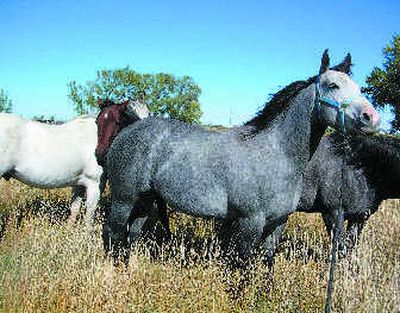Is a horse the right pet for you?

Horses have earned the reputation as the backbone of life on a ranch and farm due to their long history of being instrumental helpers in rural areas. While horses today still are in abundance on farms and ranches, that isn’t to say they should be seen as mindless powerhouses, or relegated to cowboy companions. In fact, horses are kept as pets all across the country in rural and suburban areas, just as a person might keep a dog or cat as a companion animal.
According to Animal Behavior Associates, the total number of horses owned in the U.S. in 2001 was estimated to be 5.1 million, with numbers growing today. Horses can be purchased, leased, or even adopted. Whether you choose to keep a horse as a pet companion will rely on a number of factors.
1. Expense: Horses can be expensive pets. Apart from the initial expense of purchase, food and shelter costs can quickly add up. If you are lucky enough to have ample land on your property, you may save in boarding costs. But if you need to rent a stall, it can be pricey. Many horse experts say that you’ll need at least $1,200 per month for horse care.
2. Space: Horses need exercise, a chance to graze, and a place to rest out of the elements. Individuals with a lot of acreage may be able to devote the space for stables and a corral. Others will have to keep their horse at a stable where they can then visit and ride the animal.
3. Time: Horses are time-intensive pets. That means that they will require ample amounts of your time for care. Your responsibilities will include riding and exercising, feeding, tack cleaning, mucking stalls, in addition to grooming.
4. Grooming: Grooming should be a daily habit, as grit lodged under a saddle can be uncomfortable for a horse. As well as providing a shiny coat, regular grooming also enables one to notice any abnormalities on the horse. Cuts, irritations, or fever can be detected and treated during a thorough grooming session. Expect to spend a few hours every day with horse care.
Part of horse grooming involves visits by a farrier. The farrier’s job is to take care of the feet (hooves). He or she does this by regularly keeping the hooves trimmed and observing the conditions of the hooves. The farrier will use a rasp, a hoof pick, a hoof knife, and nippers. The rasp is used like an emery board, the pick is used to clean the debris out of the foot, the hoof knife is used to clean out dead sole and the nippers are used for cutting the excess hoof wall growth off. Horses rely on their feet heavily, therefore foot maintenance is key. Farriers are responsible for this health and can take preventative measures to ensure hoof health and even work to correct certain problems.
5. Feeding: Proper nutrition will allow a horse to grow and function normally throughout its life. Hay is generally the most widely used source of food for horses, as it’s rich in vitamins, minerals and proteins, and is an essential part of normal food digestion. Make sure the hay is good quality and free of mold, as this can cause colic. A balanced diet for horses is largely based on carbohydrates, with fats and proteins as essential supplements to the diet. Corn and oats can be used as supplemental foods or treats. However, these foods are high in calories and could promote weight gain if abused. Fresh water is also necessary, and horses should have access to plenty of it.
How much food your horse will need is largely dependent upon size. According to Acreage Equines, on average a horse needs 2 to 2.2 pounds of feed for every 100 pounds of body weight. One of the leading causes of animal cruelty among horses is malnutrition, so careful attention should be placed on providing enough food.
Horses can be rewarding companions and beautiful animals for which to care. However, careful consideration should be placed on whether you have the time and money needed to keep a horse before you seek to purchase or lease an animal.